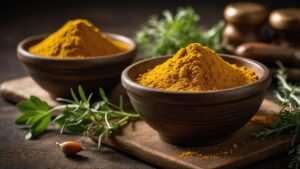
Technology is everywhere, constantly demanding our attention and energy. For many, this digital immersion leads to fatigue, stress, and even burnout—a reality that tech-dependent lifestyles create. I’ve found myself there too, where the fast pace of work and social notifications leave me craving peace. It’s no wonder so many are turning to natural remedies to combat these effects. I’m a big believer in using herbs for both detoxification and relaxation.
Years ago, I hit a point where my mind felt like it was running on fumes. I decided to experiment with a “digital detox” approach, pairing time away from screens with herbal remedies. The difference was profound. I’d seen my mother use herbs for digestion and immunity, but I hadn’t considered their impact on stress until then. In this article, I’ll share my go-to herbs and blends to help combat tech-induced fatigue, offering you ways to unwind naturally without unplugging entirely.
Read Also:
- Unlocking the Power of Traditional Chinese Medicine: How It Works and Why It Matters
- 7 Life-Changing Benefits of Ashwagandha for Holistic Well-Being Beyond Anxiety
- 10 Risks of Ashwagandha You Should Know Before Using It
- Top 5 Safe and Natural Detox Methods to Rejuvenate Your Body
I’m excited to guide you through these herbal remedies that act as an antidote to screen-related stress, offering natural ways to recharge so you can reconnect with technology in a healthier way.
The Best Herbs for a Tech-Fueled Life Detox
1. Ashwagandha: A Stress-Relief Champion
Adaptogenic Power of Ashwagandha
Ashwagandha is an ancient herb with a modern-day appeal, often referred to as the “Indian Ginseng.” This adaptogen helps the body resist physical and mental stress, making it ideal for digital detox. One friend of mine who works in tech shared how Ashwagandha transformed his after-work routine from mindlessly scrolling to a more intentional downtime.
How to Use Ashwagandha for Optimal Results
A dose of 300-500 mg daily can promote calm and focus. Ashwagandha supplements, tinctures, or teas are easy ways to incorporate this herb. I like it as a warm tea—almost like winding down with a gentle cup that reminds my mind and body to relax.
Benefits
| Benefit | Effect |
|---|---|
| Stress Relief | Calms nerves, reduces cortisol levels |
| Energy Boost | Provides sustainable energy without jitters |
| Brain Health | Enhances memory and cognitive functions |
2. Passionflower: Soothing the Overstimulated Mind
The Tranquil Herb for the Modern Soul
If there’s one herb I could recommend for the busy mind, it’s passionflower. Known for its calming effects, passionflower has been used for centuries to treat anxiety and insomnia. One thing I’ve noticed is how powerful it can be for that “tech hangover” feeling—a state of overstimulation from screen time.
Using Passionflower
I enjoy passionflower in capsule form, but it’s also delightful as a tea, especially when mixed with chamomile. Drinking a warm cup before bed lets me unwind and rest better. A 300-400 mg dose is enough to promote a peaceful mind.
3. Chamomile: A Relaxing Ritual for the Body and Mind
Chamomile and Its Calming Power
Chamomile is a classic for natural relaxation, known for reducing anxiety and encouraging sleep. Chamomile was my grandmother’s go-to, and I remember how she’d sip her tea each night, saying it “washed away the day.” I love the ritual of it.
Using Chamomile Effectively
The best way to experience chamomile is as an evening tea. Steep one to two teaspoons in hot water, add a hint of honey, and sip slowly. Chamomile tablets or tinctures are effective, too, if you prefer a faster routine.
4. Lemon Balm: The Uplifting Digital Detox Herb
Uplifting Energy for the Digital Detox
Lemon balm is a mild but potent herb that soothes while brightening mood. I found lemon balm during a stressful work period, and it gave me just enough calm and focus to get through the day.
Incorporating Lemon Balm
Lemon balm works well as a tea or in tincture form. When I’m having a high-stress day, a quick 300 mg dose can lift my mood and ease tension, giving me a sense of calm without drowsiness.
5. Holy Basil: Revitalizing Mental Clarity
Holy Basil and Mental Balance
Holy Basil, or Tulsi, is another adaptogenic herb with a rich tradition in Ayurvedic medicine. It’s celebrated for balancing mental and emotional energy, making it great for tech-induced stress. A friend of mine swears by Tulsi tea during work breaks—it helps her to refocus when she’s in front of screens for hours.
How to Use Holy Basil
You can find Tulsi in tea blends or capsules. Personally, I find a hot cup of Tulsi tea perfect for afternoon breaks, giving a clear, refreshed feeling.
6. Peppermint: Refreshing Relief for Tech-Related Headaches
Peppermint as an Energizing Herb
The cooling sensation of peppermint is great for tech-induced headaches and mental fatigue. I often make peppermint tea or use peppermint oil when I feel sluggish after a long workday. It’s like a fresh restart button.
Using Peppermint for Headache Relief
Peppermint tea, essential oils, or even fresh leaves can help clear your mind. I like to put a few drops of peppermint oil on my temples—just enough to feel its refreshing effects without it being too strong.
7. Ginger: Digestive Support and Detoxifying Aid
Ginger for Detoxification and Digestive Health
Ginger has benefits beyond just flavoring food. It’s a great herb for improving digestion and for detoxification support, particularly for those who feel that technology affects their gut. I remember being told about ginger tea as a remedy for digestive discomfort by a colleague who was always on her laptop and swore by it for its fast-acting relief.
How to Enjoy Ginger for Detox and Digestion
I love making fresh ginger tea; it’s simple and highly effective. Add thin slices of ginger to hot water and steep for 5-10 minutes. I sometimes add lemon or honey to enhance its detox benefits.
Read Also
- Serenity Now: Proven Techniques for Lasting Stress Relief
- Pure Vitality: Your Guide to Safe Detox and Rejuvenation
- Restful Nights: Your Guide to Deep, Restorative Sleep
- How to Treat Dry Skin in Winter: Dermatologist-Approved Tips for Healthy, Hydrated Skin
- Morning vs. Night Skincare Routines: What’s the Difference?
Conclusion:
If you’re feeling the impact of technology on your stress levels and energy, you’re not alone. Integrating these herbal remedies into a daily routine can provide an effective, natural balance to our screen-filled lives. I’ve seen firsthand how these small, herbal choices make a huge difference in well-being, helping me feel more grounded and focused without the constant overwhelm. Whether it’s a simple tea before bed or a relaxing herbal blend during the day, finding ways to reset is essential for thriving in our tech-driven world. So, why not take a moment, brew some tea, and allow nature to restore your calm?









